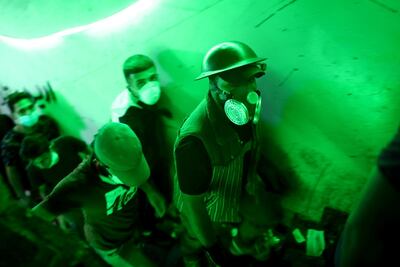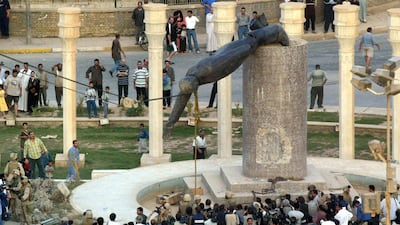With the passing of time, seminal events are often reduced to a series of images. The shocking 1972 photograph of Kim Phuc, the 9-year-old girl burnt in an American napalm attack, encapsulates the Vietnam War. Pictures of Germans celebrating on top of the Berlin Wall are often used as shorthand for the collapse of communism.
The abiding image of the 2003 US-led invasion of Iraq is that of hundreds of Iraqis pulling down a 12-metre statue of Saddam Hussein in Baghdad’s Firdos Square. More photos would emerge to become mental snapshots of the chaotic time that followed, such as that of a hooded Iraqi detainee, Ali Shallal Al Qaisi, being forced to pose on a box by US torturers at Abu Ghraib prison, or stills from a rooftop interview with information minister Muhammad Al Sahhaf, denying the invasion was happening even as the Saddam regime crumbled around him.
This week, a different image of Iraq was on show. During the Sulaimani Forum, an international gathering of academics, policymakers, journalists and campaigners at the American University in Iraq – Sulaimani, a panel of young Iraqis debated the urgent need for deep political reform.
Iraq is a country where 60 per cent of the population is under 25. This is a whole generation that has grown up with little or no direct memories of the 2003 invasion, but they have all been forced to live with its consequences. Soon, it will be this postwar generation that will run the country and deal with its challenges.
Sadly, this list of challenges is long and daunting: ISIS terrorism; a chronic lack of electricity (despite Iraq being a significant energy producer); corruption; poor infrastructure and health care; the ravages of climate change; powerful militias; an ailing economy and the ills of nepotism.
The desire for change among young people has been clear for years. Frustration among young Iraqis whose lives have been curtailed by these problems, as well as a sclerotic political system, boiled over in the 2019 protests. These provided another defining image of post-invasion Iraq – that of thousands of young people, many draped in the national flag, at the heart of Tahrir Square in Baghdad.
Despite Iraq’s chronic turmoil, two decades on from the invasion, it remains a unified state with a peaceful transfer of power and refers to the US as a partner, rather than an occupier. The country works with regional friends such as the UAE to restore damaged heritage, like Al Nuri Mosque and Al Saa'a and Al Tahera churches in Mosul.
Iraq’s politicians are at least trying to wrestle with the monster of corruption, this month summoning ministers for questioning over the allocation of funds for a major project in Nineveh. A major investigation is under way to recover the theft of $2.5 billion in public funds.
Also this week, Iraq’s Cabinet approved a $152-billion budget bill that will be scrutinised by an elected parliament.
Geopolitically, Iraq is shaking off the chaos of the invasion years and the heavy legacy of Saddam Hussein’s dictatorship. The Baghdad Conference for Co-operation and Partnership, that began a few years ago, has hosted high-level regional diplomacy that also offers the opportunity for engagement to Iran. Iraq, in time, could become an important partner as Riyadh and Tehran explore opportunities following their recent restoration of diplomatic ties.
However, looking at where Iraq stands now requires some determined optimism. The invasion removed a despotic regime, but it also led to years of conflict in which the Iraqi people bore the brunt of the suffering. The country’s wounds are far from healed and there are significant problems to tackle now and in the years ahead.
But it is a country with arable lands, and natural and human resources. Its youthful population is a source of hope, energy and dynamism. With some political will, it may be possible to deliver them a country that can meet their desire for jobs, education and stability. If Iraq can achieve this, it could become a regional powerhouse working for opportunity at home and stability abroad.
India cancels school-leaving examinations
The President's Cake
Director: Hasan Hadi
Starring: Baneen Ahmad Nayyef, Waheed Thabet Khreibat, Sajad Mohamad Qasem
Rating: 4/5
Wicked: For Good
Director: Jon M Chu
Starring: Ariana Grande, Cynthia Erivo, Jonathan Bailey, Jeff Goldblum, Michelle Yeoh, Ethan Slater
Rating: 4/5
Volunteers offer workers a lifeline
Community volunteers have swung into action delivering food packages and toiletries to the men.
When provisions are distributed, the men line up in long queues for packets of rice, flour, sugar, salt, pulses, milk, biscuits, shaving kits, soap and telecom cards.
Volunteers from St Mary’s Catholic Church said some workers came to the church to pray for their families and ask for assistance.
Boxes packed with essential food items were distributed to workers in the Dubai Investments Park and Ras Al Khaimah camps last week. Workers at the Sonapur camp asked for Dh1,600 towards their gas bill.
“Especially in this year of tolerance we consider ourselves privileged to be able to lend a helping hand to our needy brothers in the Actco camp," Father Lennie Connully, parish priest of St Mary’s.
Workers spoke of their helplessness, seeing children’s marriages cancelled because of lack of money going home. Others told of their misery of being unable to return home when a parent died.
“More than daily food, they are worried about not sending money home for their family,” said Kusum Dutta, a volunteer who works with the Indian consulate.
MATCH INFO
Uefa Champions League semi-final, first leg
Barcelona v Liverpool, Wednesday, 11pm (UAE).
Second leg
Liverpool v Barcelona, Tuesday, May 7, 11pm
Games on BeIN Sports
Timeline
2012-2015
The company offers payments/bribes to win key contracts in the Middle East
May 2017
The UK SFO officially opens investigation into Petrofac’s use of agents, corruption, and potential bribery to secure contracts
September 2021
Petrofac pleads guilty to seven counts of failing to prevent bribery under the UK Bribery Act
October 2021
Court fines Petrofac £77 million for bribery. Former executive receives a two-year suspended sentence
December 2024
Petrofac enters into comprehensive restructuring to strengthen the financial position of the group
May 2025
The High Court of England and Wales approves the company’s restructuring plan
July 2025
The Court of Appeal issues a judgment challenging parts of the restructuring plan
August 2025
Petrofac issues a business update to execute the restructuring and confirms it will appeal the Court of Appeal decision
October 2025
Petrofac loses a major TenneT offshore wind contract worth €13 billion. Holding company files for administration in the UK. Petrofac delisted from the London Stock Exchange
November 2025
180 Petrofac employees laid off in the UAE
Founders: Abdulmajeed Alsukhan, Turki Bin Zarah and Abdulmohsen Albabtain.
Based: Riyadh
Offices: UAE, Vietnam and Germany
Founded: September, 2020
Number of employees: 70
Sector: FinTech, online payment solutions
Funding to date: $116m in two funding rounds
Investors: Checkout.com, Impact46, Vision Ventures, Wealth Well, Seedra, Khwarizmi, Hala Ventures, Nama Ventures and family offices
Sam Smith
Where: du Arena, Abu Dhabi
When: Saturday November 24
Rating: 4/5
The National's picks
4.35pm: Tilal Al Khalediah
5.10pm: Continous
5.45pm: Raging Torrent
6.20pm: West Acre
7pm: Flood Zone
7.40pm: Straight No Chaser
8.15pm: Romantic Warrior
8.50pm: Calandogan
9.30pm: Forever Young
SPEC%20SHEET%3A%20APPLE%20M3%20MACBOOK%20AIR%20(13%22)
%3Cp%3E%3Cstrong%3EProcessor%3A%3C%2Fstrong%3E%20Apple%20M3%2C%208-core%20CPU%2C%20up%20to%2010-core%20CPU%2C%2016-core%20Neural%20Engine%3C%2Fp%3E%0A%3Cp%3E%3Cstrong%3EDisplay%3A%3C%2Fstrong%3E%2013.6-inch%20Liquid%20Retina%2C%202560%20x%201664%2C%20224ppi%2C%20500%20nits%2C%20True%20Tone%2C%20wide%20colour%3C%2Fp%3E%0A%3Cp%3E%3Cstrong%3EMemory%3A%3C%2Fstrong%3E%208%2F16%2F24GB%3C%2Fp%3E%0A%3Cp%3E%3Cstrong%3EStorage%3A%3C%2Fstrong%3E%20256%2F512GB%20%2F%201%2F2TB%3C%2Fp%3E%0A%3Cp%3E%3Cstrong%3EI%2FO%3A%3C%2Fstrong%3E%20Thunderbolt%203%2FUSB-4%20(2)%2C%203.5mm%20audio%2C%20Touch%20ID%3C%2Fp%3E%0A%3Cp%3E%3Cstrong%3EConnectivity%3A%3C%2Fstrong%3E%20Wi-Fi%206E%2C%20Bluetooth%205.3%3C%2Fp%3E%0A%3Cp%3E%3Cstrong%3EBattery%3A%3C%2Fstrong%3E%2052.6Wh%20lithium-polymer%2C%20up%20to%2018%20hours%2C%20MagSafe%20charging%3C%2Fp%3E%0A%3Cp%3E%3Cstrong%3ECamera%3A%3C%2Fstrong%3E%201080p%20FaceTime%20HD%3C%2Fp%3E%0A%3Cp%3E%3Cstrong%3EVideo%3A%3C%2Fstrong%3E%20Support%20for%20Apple%20ProRes%2C%20HDR%20with%20Dolby%20Vision%2C%20HDR10%3C%2Fp%3E%0A%3Cp%3E%3Cstrong%3EAudio%3A%3C%2Fstrong%3E%204-speaker%20system%2C%20wide%20stereo%2C%20support%20for%20Dolby%20Atmos%2C%20Spatial%20Audio%20and%20dynamic%20head%20tracking%20(with%20AirPods)%3C%2Fp%3E%0A%3Cp%3E%3Cstrong%3EColours%3A%3C%2Fstrong%3E%20Midnight%2C%20silver%2C%20space%20grey%2C%20starlight%3C%2Fp%3E%0A%3Cp%3E%3Cstrong%3EIn%20the%20box%3A%3C%2Fstrong%3E%20MacBook%20Air%2C%2030W%2F35W%20dual-port%2F70w%20power%20adapter%2C%20USB-C-to-MagSafe%20cable%2C%202%20Apple%20stickers%3C%2Fp%3E%0A%3Cp%3E%3Cstrong%3EPrice%3A%3C%2Fstrong%3E%20From%20Dh4%2C599%3C%2Fp%3E%0A
More on animal trafficking
Expert input
If you had all the money in the world, what’s the one sneaker you would buy or create?
“There are a few shoes that have ‘grail’ status for me. But the one I have always wanted is the Nike x Patta x Parra Air Max 1 - Cherrywood. To get a pair in my size brand new is would cost me between Dh8,000 and Dh 10,000.” Jack Brett
“If I had all the money, I would approach Nike and ask them to do my own Air Force 1, that’s one of my dreams.” Yaseen Benchouche
“There’s nothing out there yet that I’d pay an insane amount for, but I’d love to create my own shoe with Tinker Hatfield and Jordan.” Joshua Cox
“I think I’d buy a defunct footwear brand; I’d like the challenge of reinterpreting a brand’s history and changing options.” Kris Balerite
“I’d stir up a creative collaboration with designers Martin Margiela of the mixed patchwork sneakers, and Yohji Yamamoto.” Hussain Moloobhoy
“If I had all the money in the world, I’d live somewhere where I’d never have to wear shoes again.” Raj Malhotra
What is an ETF?
An exchange traded fund is a type of investment fund that can be traded quickly and easily, just like stocks and shares. They come with no upfront costs aside from your brokerage's dealing charges and annual fees, which are far lower than on traditional mutual investment funds. Charges are as low as 0.03 per cent on one of the very cheapest (and most popular), Vanguard S&P 500 ETF, with the maximum around 0.75 per cent.
There is no fund manager deciding which stocks and other assets to invest in, instead they passively track their chosen index, country, region or commodity, regardless of whether it goes up or down.
The first ETF was launched as recently as 1993, but the sector boasted $5.78 billion in assets under management at the end of September as inflows hit record highs, according to the latest figures from ETFGI, a leading independent research and consultancy firm.
There are thousands to choose from, with the five largest providers BlackRock’s iShares, Vanguard, State Street Global Advisers, Deutsche Bank X-trackers and Invesco PowerShares.
While the best-known track major indices such as MSCI World, the S&P 500 and FTSE 100, you can also invest in specific countries or regions, large, medium or small companies, government bonds, gold, crude oil, cocoa, water, carbon, cattle, corn futures, currency shifts or even a stock market crash.
Closing the loophole on sugary drinks
As The National reported last year, non-fizzy sugared drinks were not covered when the original tax was introduced in 2017. Sports drinks sold in supermarkets were found to contain, on average, 20 grams of sugar per 500ml bottle.
The non-fizzy drink AriZona Iced Tea contains 65 grams of sugar – about 16 teaspoons – per 680ml can. The average can costs about Dh6, which would rise to Dh9.
Drinks such as Starbucks Bottled Mocha Frappuccino contain 31g of sugar in 270ml, while Nescafe Mocha in a can contains 15.6g of sugar in a 240ml can.
Flavoured water, long-life fruit juice concentrates, pre-packaged sweetened coffee drinks fall under the ‘sweetened drink’ category
Not taxed:
Freshly squeezed fruit juices, ground coffee beans, tea leaves and pre-prepared flavoured milkshakes do not come under the ‘sweetened drink’ band.
Brief scoreline:
Al Wahda 2
Al Menhali 27', Tagliabue 79'
Al Nassr 3
Hamdallah 41', Giuliano 45 1', 62'
Results
%3Cp%3E%3Cstrong%3EStage%207%3A%3C%2Fstrong%3E%3Cbr%3E1.%20Adam%20Yates%20(GBR)%20UAE%20Team%20Emirates%20%E2%80%93%203hrs%2029min%2042ses%3Cbr%3E2.%20Remco%20Evenepoel%20(BEL)%20Soudal%20Quick-Step%20%E2%80%93%2010sec%3Cbr%3E3.%20Geoffrey%20Bouchard%20(FRA)%20AG2R%20Citroen%20Team%20%E2%80%93%2042sec%3Cbr%3E%3Cstrong%3EGeneral%20Classification%3A%3C%2Fstrong%3E%3Cbr%3E1.%20Remco%20Evenepoel%20(BEL)%20Soudal%20Quick-Step%3Cbr%3E2.%20Lucas%20Plapp%20(AUS)%20Ineos%20Grenaders%20%E2%80%93%2059se%3Cbr%3E3.%20Adam%20Yates%20(GBR)%20UAE%20Team%20Emirates%20%E2%80%9360sec%3Cbr%3ERed%20Jersey%20(General%20Classification)%3A%20Remco%20Evenepoel%20(BEL)%20Soudal%20Quick-Step%3Cbr%3EGreen%20Jersey%20(Points%20Classification)%3A%20Tim%20Merlier%20(BEL)%20Soudal%20Quick-Step%3Cbr%3EWhite%20Jersey%20(Young%20Rider%20Classification)%3A%20Remco%20Evenepoel%20(BEL)%20Soudal%20Quick-Step%3Cbr%3EBlack%20Jersey%20(Intermediate%20Sprint%20Classification)%3A%20Edward%20Planckaert%20(FRA)%20Alpecin-Deceuninck%3C%2Fp%3E%0A
MATCH INFO
Wales 1 (Bale 45 3')
Croatia 1 (Vlasic 09')
SPEC%20SHEET%3A%20APPLE%20IPHONE%2014
%3Cp%3E%3Cstrong%3EDisplay%3A%3C%2Fstrong%3E%C2%A06.1%22%20Super%20Retina%20XDR%20OLED%2C%202532%20x%201170%2C%20460ppi%2C%20HDR%2C%20True%20Tone%2C%20P3%2C%201200%20nits%3C%2Fp%3E%0A%3Cp%3E%3Cstrong%3EProcessor%3A%3C%2Fstrong%3E%C2%A0A15%20Bionic%2C%206-core%20CPU%2C%205-core%20GPU%2C%2016-core%20Neural%20Engine%C2%A0%3C%2Fp%3E%0A%3Cp%3E%3Cstrong%3EMemory%3A%3C%2Fstrong%3E%C2%A06GB%3C%2Fp%3E%0A%3Cp%3E%3Cstrong%3ECapacity%3A%3C%2Fstrong%3E%C2%A0128%2F256%2F512GB%3C%2Fp%3E%0A%3Cp%3E%3Cstrong%3EPlatform%3A%3C%2Fstrong%3E%C2%A0iOS%2016%3C%2Fp%3E%0A%3Cp%3E%3Cstrong%3EMain%20camera%3A%3C%2Fstrong%3E%C2%A0Dual%2012MP%20main%20(f%2F1.5)%20%2B%2012MP%20ultra-wide%20(f%2F2.4)%3B%202x%20optical%2C%205x%20digital%3B%20Photonic%20Engine%2C%20Deep%20Fusion%2C%20Smart%20HDR%204%2C%20Portrait%20Lighting%3C%2Fp%3E%0A%3Cp%3E%3Cstrong%3EMain%20camera%20video%3A%3C%2Fstrong%3E%C2%A04K%20%40%2024%2F25%2F3060fps%2C%20full-HD%20%40%2025%2F30%2F60fps%2C%20HD%20%40%2030fps%3B%20HD%20slo-mo%20%40%20120%2F240fps%3B%20night%2C%20time%20lapse%2C%20cinematic%2C%20action%20modes%3B%20Dolby%20Vision%2C%204K%20HDR%3C%2Fp%3E%0A%3Cp%3E%3Cstrong%3EFront%20camera%3A%3C%2Fstrong%3E%C2%A012MP%20TrueDepth%20(f%2F1.9)%2C%20Photonic%20Engine%2C%20Deep%20Fusion%2C%20Smart%20HDR%204%3B%20Animoji%2C%20Memoji%3B%20Portrait%20Lighting%3C%2Fp%3E%0A%3Cp%3E%3Cstrong%3EFront%20camera%20video%3A%3C%2Fstrong%3E%204K%20%40%2024%2F25%2F3060fps%2C%20full-HD%20%40%2025%2F30%2F60fps%2C%20HD%20slo-mo%20%40%20120fps%3B%20night%2C%20time%20lapse%2C%20cinematic%2C%20action%20modes%3B%20Dolby%20Vision%2C%204K%20HDR%3C%2Fp%3E%0A%3Cp%3E%3Cstrong%3EBattery%3A%3C%2Fstrong%3E%C2%A03279%20mAh%2C%C2%A0up%20to%2020h%20video%2C%2016h%20streaming%20video%2C%2080h%20audio%3B%20fast%20charge%20to%2050%25%20in%2030m%3B%20MagSafe%2C%20Qi%20wireless%20charging%3C%2Fp%3E%0A%3Cp%3E%3Cstrong%3EConnectivity%3A%3C%2Fstrong%3E%C2%A0Wi-Fi%2C%20Bluetooth%205.3%2C%20NFC%20(Apple%20Pay)%3C%2Fp%3E%0A%3Cp%3E%3Cstrong%3EBiometrics%3A%3C%2Fstrong%3E%20Face%20ID%3C%2Fp%3E%0A%3Cp%3E%3Cstrong%3EI%2FO%3A%3C%2Fstrong%3E%C2%A0Lightning%3C%2Fp%3E%0A%3Cp%3E%3Cstrong%3ECards%3A%3C%2Fstrong%3E%C2%A0Dual%20eSIM%20%2F%20eSIM%20%2B%20SIM%20(US%20models%20use%20eSIMs%20only)%3C%2Fp%3E%0A%3Cp%3E%3Cstrong%3EColours%3A%3C%2Fstrong%3E%C2%A0Blue%2C%20midnight%2C%20purple%2C%20starlight%2C%20Product%20Red%3C%2Fp%3E%0A%3Cp%3E%3Cstrong%3EIn%20the%20box%3A%3C%2Fstrong%3E%C2%A0iPhone%2014%2C%20USB-C-to-Lightning%20cable%2C%20one%20Apple%20sticker%3C%2Fp%3E%0A%3Cp%3E%3Cstrong%3EPrice%3A%3C%2Fstrong%3E%C2%A0Dh3%2C399%20%2F%20Dh3%2C799%20%2F%20Dh4%2C649%3C%2Fp%3E%0A
INDIA'S%20TOP%20INFLUENCERS
%3Cp%3E%3Cstrong%3EBhuvan%20Bam%3C%2Fstrong%3E%3Cbr%3E%3Ca%20href%3D%22https%3A%2F%2Fwww.instagram.com%2Fbhuvan.bam22%2F%3Fhl%3Den%22%20target%3D%22_self%22%3EInstagram%3C%2Fa%3E%20followers%3A%2016.1%20million%3Cbr%3EBhuvan%20Bam%20is%20a%2029-year-old%20comedian%20and%20actor%20from%20Delhi%2C%20who%20started%20out%20with%20YouTube%20channel%2C%20%E2%80%9CBB%20Ki%20Vines%E2%80%9D%20in%202015%2C%20which%20propelled%20the%20social%20media%20star%20into%20the%20limelight%20and%20made%20him%20sought-after%20among%20brands.%3Cbr%3E%3Cstrong%3EKusha%20Kapila%3C%2Fstrong%3E%3Cbr%3E%3Ca%20href%3D%22https%3A%2F%2Fwww.instagram.com%2Fkushakapila%2F%3Fhl%3Den%22%20target%3D%22_self%22%3EInstagram%3C%2Fa%3E%20followers%3A%203.1%20million%3Cbr%3EKusha%20Kapila%20is%20a%20fashion%20editor%20and%20actress%2C%20who%20has%20collaborated%20with%20brands%20including%20Google.%20She%20focuses%20on%20sharing%20light-hearted%20content%20and%20insights%20into%20her%20life%20as%20a%20rising%20celebrity.%3Cbr%3E%3Cstrong%3EDiipa%20Khosla%3C%2Fstrong%3E%3Cbr%3E%3Ca%20href%3D%22https%3A%2F%2Fwww.instagram.com%2Fdiipakhosla%2F%3Fhl%3Den%22%20target%3D%22_self%22%3EInstagram%3C%2Fa%3E%20followers%3A%201.8%20million%3Cbr%3EDiipa%20Khosla%20started%20out%20as%20a%20social%20media%20manager%20before%20branching%20out%20to%20become%20one%20of%20India's%20biggest%20fashion%20influencers%2C%20with%20collaborations%20including%20MAC%20Cosmetics.%3Cbr%3E%3Cstrong%3EKomal%20Pandey%3Cbr%3E%3C%2Fstrong%3E%3Ca%20href%3D%22https%3A%2F%2Fwww.instagram.com%2Fkomalpandeyofficial%2F%3Fhl%3Den%22%20target%3D%22_self%22%3EInstagram%3C%2Fa%3E%20followers%3A%201.8%20million%3Cbr%3EKomal%20Pandey%20is%20a%20fashion%20influencer%20who%20has%20partnered%20with%20more%20than%20100%20brands%2C%20including%20Olay%20and%20smartphone%20brand%20Vivo%20India.%3Cbr%3E%3Cstrong%3ENikhil%20Sharma%3C%2Fstrong%3E%3Cbr%3E%3Ca%20href%3D%22https%3A%2F%2Fwww.instagram.com%2Fnikkkhil%2F%3Fhl%3Den%22%20target%3D%22_self%22%3EInstagram%3C%2Fa%3E%20followers%3A%201.4%20million%3Cbr%3ENikhil%20Sharma%20from%20Mumbai%20began%20his%20online%20career%20through%20vlogs%20about%20his%20motorcycle%20trips.%20He%20has%20become%20a%20lifestyle%20influencer%20and%20has%20created%20his%20own%20clothing%20line.%3Cbr%3E%3Cem%3ESource%3A%20Hireinfluence%2C%20various%3C%2Fem%3E%3Cbr%3E%3C%2Fp%3E%0A



